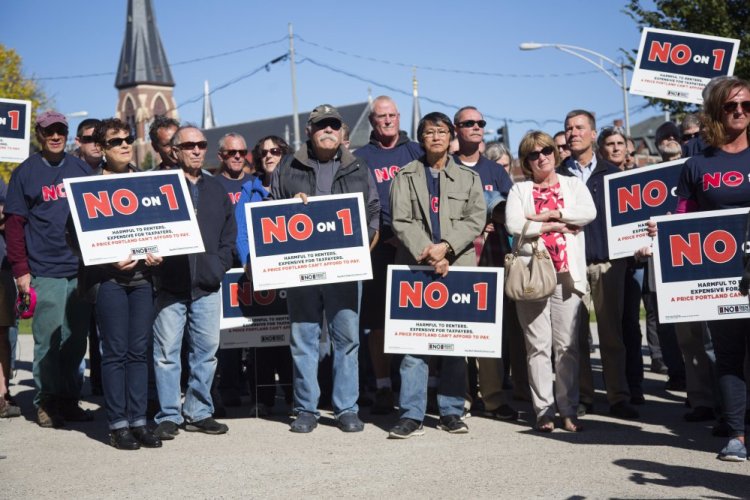Over 100 people rallied Thursday in Lincoln Park in opposition to Question 1 on Portland’s municipal ballot, which would limit rent increases and strengthen protections for tenants.
Landlords, contractors and real estate agents warned that the so-called rent stabilization measure being pushed by Fair Rent Portland would make landlords less willing to invest in their properties because it would limit their ability to increase rents while also making it more difficult for landlords to get rid of problem tenants.
The measure would also create a rent board, which would be charged with issuing rulings and fines regarding improper evictions or rent increases.
“It may be well-intentioned, but it is not well-written and its effects are going to be bad,” said Brit Vitalius, spokesman for Say No To Rent Control, the opposition group that organized the rally. “It’s going to put tenants at risk. It puts this crazy rent board in control and it’s going to be a disaster for the city.”
The rally was organized about a week after Say No To Rent Control reported a significant fundraising advantage over Fair Rent Portland. The opposition raised nearly $150,000 during the last quarter to defeat the ballot question, while Fair Rent Portland had raised only $3,200.
The measure was proposed after rents increased by as much as 40 percent in Maine’s largest city from 2010 to 2015, driven by an increase in demand for a limited amount of housing. However, landlords have said rents have not increased in the last two years.
Fair Rent Portland organizer Jack O’Brien said “it’s not surprising, but it’s sad” that landlords are investing heavily to defeat the initiative, while also arguing they will be unable to afford to keep up their apartments if it’s enacted.
“They are now using that money trying to organize against tenants trying to fight against those kinds of increases,” O’Brien said. “Fights like this are never fair. (Landlords and developers) are the largest and most well-funded interest in the city.”
If passed by voters on Nov. 7, the rent stabilization ordinance would limit rent increases to inflation plus property tax increases in the Portland metro area for landlords with six or more units. Landlords could get additional increases of up to 10 percent in any given year, if they receive approval from a seven-member rent board, which would also have the power to fine landlords who don’t comply with the ordinance.
Units built after Jan. 1, 2017, will be exempt.
The ordinance would increase the city’s current registration fee for rental units by $30 a unit, from $35 a unit to $65.
If approved, the ordinance could not be changed by the City Council for five years. And the ordinance contains a sunset provision that would take effect in 2025.
The ordinance also lays out specific criteria for evicting tenants with rental agreements, including lease violations, failure to pay rent and being a nuisance.
Vitalius said those provisions would make it impossible for landlords to get rid of problem tenants by choosing not to renew a lease, while also extending the timeline for evicting troublesome tenants from a minimum of seven days to 60 days.
O’Brien, however, said the ordinance still allows a landlord to refuse to renew a lease, and the criteria for evicting tenants is the same criteria used by the courts. “The idea that this is an endless renewal process is factually false,” he said.
Jonathan Culley, a developer, said that the ordinance could be easily gamed, because many commercial property owners set up individual limited liability companies for each property they own and that ownership structure is not addressed in the ordinance. He also noted that landlords in West Hollywood, California, which also has rent stabilization, resorted to a new slate of fees, including “refrigerator fees,” to get more money out of tenants.
“They can’t increase their rents so they start nickel-and-diming and goosing their tenants with fees which are allowed in the ordinance,” he said.
But O’Brien noted that the fee issue has since been addressed by West Hollywood and he believes there will not be an incentive to game the system in Portland. “It’s not really going to eat into people’s profits so there really isn’t going to be an incentive to game the system,” O’Brien said.
Correction: This story was updated at 10:20 a.m. on October 13, 2017 to correct the amount that Portland’s registration fees would increase under the proposed ordinance.
Randy Billings can be reached at 791-6346 or at:
rbillings@pressherald.com
Twitter: randybillings
Send questions/comments to the editors.


